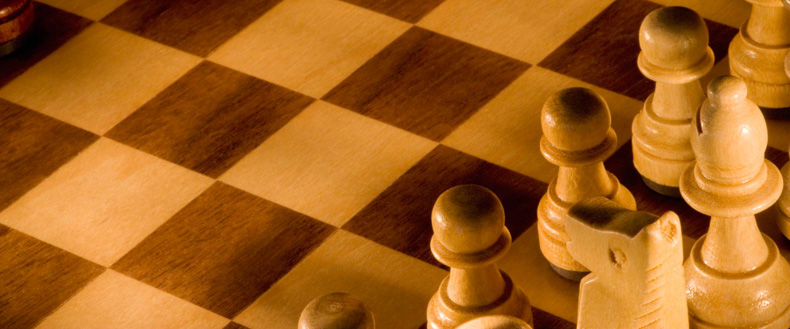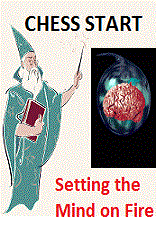
Common Tournament Questions
Parents should expect to console their children when they lose and encourage good sportsmanship regardless of the results. Children play chess best when they are not surging with adrenaline (or sugar) and when they know that their primary aim is to play their best, not necessarily to win. The ultimate winners of every event are the players who do not get too low after a defeat, or too high after a win.
What is a Swiss-System Tournament?
Pairings: Most chess tournaments are set up using a Swiss-System format. This means that players are paired against others with similar scores. The pairing system is quite complicated and leaves the director almost no room for discretion. At the Chess Emporium and at tournaments we direct, we use a computer program that does the pairings for us. Although experienced directors will review the pairings for accuracy,
the director never arbitrarily makes changes in the pairings the computer assigns.
In short, the Swiss System operates by ordering the players by rating, and playing the top player with the player just under the half-way mark. The second player is paired against the next player under the opponent of the top player, and so forth.
Players earn one point for winning, a half point for drawing. In each round after the first round, the players compete with others who have the same number of points. If there is an odd number of players in a score group, the lowest ranked player in the group is paired against the top available player in the next group down.
Players never compete against the same opponent twice in a tournament, and efforts are made to alternate the color of the pieces the player uses each round.
Nobody is eliminated in a Swiss System tournament. All players hopefully will compete all of the way through the tournament, except for byes.
Byes: A player with a bye does not play in a particular round. There are two types of byes. When a tournament has an odd number of players, the bottom player does not play one round. Instead, that player is awarded a full-point bye meaning that the player receives a point, as if s/he won a game. No player receives more than one forced bye per tournament. Sometimes, the player receiving the bye will be paired against someone else, who either is not enrolled in the tournament or is enrolled in a different section that also has an odd number of players. In a rated tournament the game will count for ratings, but the players both receive a point for the tournament.
In a rated tournament, a player competing in his/her first tournament will not receive a bye, except in very unusual circumstances. This is because a player will not earn a publishable rating until s/he has played four games, and we want players to earn rating as fast as possible.
Players unable to be at the tournament for a certain round may request a half-point bye. This second type of bye awards a player the same score as would a draw. In most tournaments, half-point byes must be requested before the player begins to play in the event and are not changeable. They are most often taken in the first round, when a
player cannot get to the tournament by the time it begins.
Withdrawing: We strongly discourage withdrawing from tournaments. Players who leave because they lose are missing some of the greatest benefits of the game. Learning to come back after a defeat is very important is much more than just chess. However, if an emergency arises and a player must leave, it is crucial to inform the tournament director that the player will not attend the next round. It is unfair to the others in the tournament to leave without telling the director, as it means that at least one other
player will not get to play a game.
The Awards Ceremony: Similarly, we think that all players should remain for the awards ceremony. Those who win the top prizes, naturally, feel better knowing that their efforts are recognized by others.
Tiebreaks:In most tournaments, a pre-determined number of top prizes (usually trophies) are awarded at the end. In a four-round tournament (which is most common) there will always be ties. When two or more players have won all of their games, we will have a blitz chess play-off, in which the co-champions play each other in a game of
five-minute chess to determine 1st place trophy, while the others will be determined by tie-breaks. When the tied players did not win all of their games, we use a tiebreak system that determines the strength of the players competition by counting the number of points the opponents earned. (Ratings are irrelevant to tiebreaks.)
How do I learn about tournaments? Local Tournaments rated by the USCF are nearly always advertised in the web site of Chess Start or are available at www.USCF.org How do I read the Tournament Life Announcements? The codes used to save space in the Announcements (TLAs) can be quite confusing. Please use this as a reference:
-
#-SS: Swiss System. The number that precedes the code tells you how many rounds (games) each player will play.
-
#-RR: Round Robin. A round-robin tournament means each player in a section will play every other player.
-
TC: Time Control. How much time each player has to avoid being forfeited. G/30 (also known as action chess) means each player has 30 minutes for the game, so an entire game will last one hour or less; this is the most common time control for scholastic events. 40/2 means that a player must make 40 moves in the first two hours, and then the player receives more time to make additional moves.
-
Reg: Registration. Players who have not pre-registered must come during
the hours specified to sign up for the tournament. -
Rds: Rounds. What time the games will start.
-
EF: Entry Fee.
-
$$: Prizes (G, under prizes, means Guaranteed, as opposed to b/#, which
means based on a certain number of entries.) -
NS NC W: No Smoking, Computers may not play, Wheelchair accessible.
-
Ent: Advanced registration should be sent to the person listed.
Registration: Some tournaments offer a reduction in price for players who register in advance. It is in the interest of both the organizer and the players to register early, as long lines form of players who have waited until the last minute to sign up. Normally, once a player has paid an entry fee, the player need only show up at the time the first round is scheduled. If the tournament is free, players must come at the registration time to let the organizer know that they intend to play and should be paired with an opponent.
The Tournament Director: The Tournament Director (TD) makes the pairings each round and settles any sort of dispute that arises during a game. TDs rule on claims of time forfeiture and claims of draws. TDs have the authority to punish bad behavior or other rules violations by adding or subtracting time from a player, or by forfeiting a game.
Parents: In general, parents and coaches are required to stay out of the room where the children are playing. They can serve several useful functions, however. Tournaments last a long time, and parents can be very helpful by providing food for their children. Although many kids can plan a power lunch and choose foods that will allow them to play
their best, others need guidance in this area, lest they eat nothing but candy and soda. Parents offer encouragement and consolation between rounds, and some provide help analyzing the games their kids played. Children are not well served by having parents argue about such things as pairings or rulings of the TD. Such arguments delay the entire tournament, which goes on long enough as it is. A four round tournament with a G/30 time control will last more than five hours, including registration, a lunch break, and the awards ceremony. Usually the advertisements for a tournament will give some indication of when the event is expected to end.
